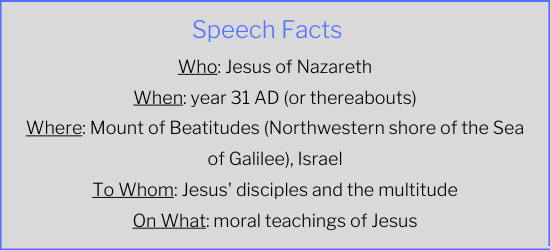 The Sermon on the Mount, delivered by Jesus of Nazareth, is one of my favorite speeches by anyone alive or dead. Of course, born 2,021 years ago, the Christian Jesus lives, even if the historical one does not.
The Sermon on the Mount, delivered by Jesus of Nazareth, is one of my favorite speeches by anyone alive or dead. Of course, born 2,021 years ago, the Christian Jesus lives, even if the historical one does not.
As far as I’m concerned, Christianity could do away with large portions of the New and Old Testaments, and focus more on the Sermon on the Mount -the whole Sermon, not just the part that Christians know as “The Lord’s Prayer.”
The writing is powerful, direct and accessible. I don’t agree with every single sentence, but the message of universal love is clear and, as as we’d say today, actionable.
Here are my favorite excerpts from the Sermon, with a bit of commentary to follow. The bold font is mine:
Blessed are the pure in heart; for they shall see God.
Ye have heard that it hath been said, “Thou shalt love thy neighbor, and hate thine enemy.” But I say unto you, “Love your enemies, bless them that curse you, do good to them that hate you, and pray for them that despitefully use you, and persecute you; that ye may be the children of your Father which is in heaven: for he maketh his sun to rise on the evil and on the good, and sendeth rain on the just and on the unjust.” For if ye love them which love you, what reward have ye?
Lay not up for yourselves treasures upon earth, where moth and rust doth corrupt, and where thieves break through and steal: But lay up for yourselves treasures in heaven, where neither moth nor rust doth corrupt, and where thieves do not break through nor steal. For where your treasure is, there will your heart be also.
Judge not, that ye not be judged. For with what judgment ye judge, ye shall be judged: and with what measure you mete, it shall be measured to you again. And why beholdest thou the mote that is in thy brother’s eye, but considerest not the beam that is in thine own eye?

The Sermon is an ideal to strive for. In other words, it is impossible for any human to follow all of it precepts. Yet, as New York University professor Michael Shenefelt notes, “The existence of an ideal has nothing to do with whether anyone actually lives up to it.” (The Questions of Moral Philosophy)
Overall, how well have Christians done in their pursuit of this ideal over the nearly 2,000 years since Jesus lived on Earth? At the institutional level, the record is atrocious: slavery, the Crusades, genocides, burnings at the stake, colonialism.
At the individual level, I’m sure many Christians try really really hard to “bless them that curse you, do good to them that hate you, and pray for them that despitefully use you.” But then there are also those who, while emphasizing their Christian beliefs, embrace the division strategy, the tactic of us vs. them, of demonizing the other.
Of course, Christianity is not the only religion with a message of universal love. Nor are Christians the only humans who commit barbaric acts. There’s no monopoly on the human capacity for both good and evil.
It’s a good thing that speeches like the Sermon on the Mount have an appeal beyond the Christian faith. In fact, the best take I’ve come across on the Sermon comes from writer Kurt Vonnegut, who was an atheist, in his Commencement address at Agnes Scott College (Decatur, Georgia, 1999):
“If what Jesus said was good, and so much of it was beautiful, what does it matter if he was God or not? If Christ hadn’t delivered the Sermon on the Mount, with its message of mercy and pity, I wouldn’t want to be a human being. I would just as soon be a rattlesnake.”
Disclaimer: I was raised Roman Catholic. Therefore, even if I’m currently more of a cultural than a devout Catholic, I know I’m still biased.
Here’s a link to the complete Sermon Sermon.

